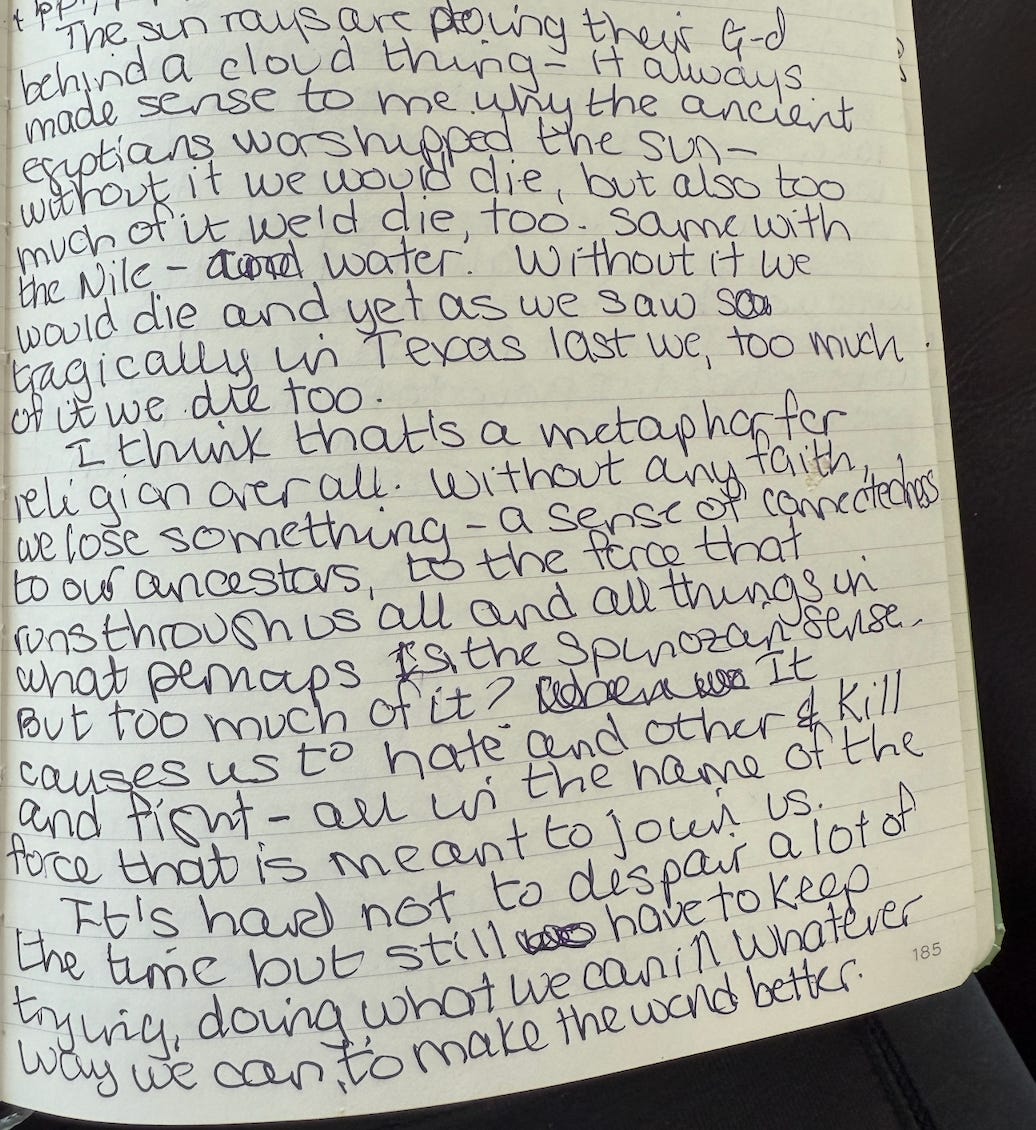If not now...when?
“If I am not for myself, who will be for me? If I am only for myself, what am I? And if not now, when?” Rabbi Hillel, Pirkei Avot 1:14
Last week, my son texted me a link to an article about a new Israeli Foreign Office initiative:
He asked: “Do you still feel that attachment to Israel that I’ve never really shared, even if just residual?”
I struggled to answer him. This latest was another nail to the heart, one of so many that have punctured the vision of Israel I had as little girl when I put quarters in a JNF folder every week at Hebrew school back in the late ‘60s.
I cannot for the life of me understand why the Israeli government thinks this is a good idea.
Well, actually, I can, because it’s a continuation of the same misguided policies Netanyahu has been pursuing for a quarter century at this point, except this time he’s got the meshuggenah equivalents of Fred Phelps and Pat Robertson in his government pushing for even more insanity. Messianic extremists who threaten to leave the government if there’s any hint they can’t keep receiving taxpayer subsidies to keep their own kids safe studying religious curricula in yeshivahs, while expecting secular Israelis to sacrifice their sons and daughters to the war. Extremists like Itamar Ben -Gvir and Bezalel Smotrich, who are openly willing to sacrifice the lives of the remaining hostages and other people’s children to pursue their vision of annexing the West Bank and Gaza. Extremists who use the same kind of dehumanizing language to describe Palestinians that has been used about Jews throughout the centuries, making a mockery of “Never Again.”
As former Jerusalem Post editor-in-chief Yaakov Katz described Ben-Gvir in a November 2022 interview: “He is, in my view, a combination of an American white supremacist together with a European fascist, all in one. He’s everything I think the people who founded this state, the people who fought and continue to fight and die for this state do not believe in.”
My own deeply conflicted feelings didn’t just start as a result of what’s transpired in Gaza since October 7th. It’s been gradual, painful process that I’ve struggled with for over two decades.
Fifteen years ago, when I was still a columnist for Hearst, I wrote a piece: You can love Israel, but disagree with current policy. It concluded with this:
Battles are fought with weapons but wars are won with ideas. Israeli writer Amos Oz wrote recently: "Hamas is not just a terrorist organization. Hamas is an idea, a desperate and fanatical idea that grew out of the desolation and frustration of many Palestinians. No idea has ever been defeated by force. To defeat an idea, you have to offer a better idea, a more attractive and acceptable one."
That is why the Netanyahu government's approach will fail to bring the very guarantee of security it claims to seek by its actions.
Netanyahu was wrong then and he’s even more wrong now.
It’s become impossible to reconcile Israeli government policy with Jewish values which is ironic because that policy is being driven by loudly religious Messianic Zionists like Itamar Ben-Gvir, a Kahanist, and Bezalel Smotrich, a self-declared “fascist homophobe.” As someone who searches for truth in the grey areas, I’ve always felt uncomfortable with rigid orthodoxy of any kind, be it religious or cultural. I’ve seen too many people believe they are holier than thou because they strictly observe the ritual of religious law, while blithely ignoring the spirit, the idea intended to be reinforced by those practices. See the many instances of violence against Palestinians in the West Bank by religious zealots.
And here’s something I think that gets lost in the current discourse, particularly in online spaces where nuance goes to die.
Just as I see a distressing amount of Jewish friends seeming to rationalize the inexcusable because of October 7th, I see too many non-Jewish friends and colleagues ignore that before October 7th, secular Israelis felt very much like we do here watching the Trump and a complicit Republican party trying to dismantle democratic institutions. A 2016 Pew Poll shows the deep gulf between secular Israelis and the Ultra-orthdox. There were massive protests against Netanyahu’s law to limit the power Supreme Court. As one of the tens of thousands of protestors said at the time:"Netanyahu kidnapped the country and I am worried it will become a theocracy." They’re fighting the same battles we are - feeling the same frustrations we are, trying to work with their Palestinian neighbors for peace and understanding, and furious at their own government for being willing to sacrifice the hostages to maintain its own power.
And yet as so many of us in America have experienced, too many on the left want to lump them, merely due to nationality and religion, as the enemy, rather than allies who could help with the cause of peace.
After the trauma of October 7th (whose victims were mainly more secular Israelis) those protestors shifted to helping civilians and soldiers impacted by the attack. But the protests have returned as it’s become abundantly clear that the Israeli government is willing to sacrifice the remaining hostages to take over Gaza, going against the advice of the military and 3/4 of the Israeli population. It’s all part of a grand, messianic vision.
Mirroring the growing gulf between secular Israelis and the Ultra Orthodox in Israel, is the one between right-wing Israelis and progressive Jews in the Diaspora. The Israeli government—and legacy American Jewish institutions like AIPAC, the ADL, and the recently retired rabbi of my synagogue—expects our unquestioning devotion and financial support for Israel even as the Netanyahu government has shown complete disregard for our lives and safety.
Younger Americans have never known an Israel without Netanyahu. As a result, the vision they have of Israel is not “the Land of Milk and Honey”. How can they believe the claim that Israel is “the only democracy in the Middle East” when they see Netanyahu and his extremist allies actively working to destroy that democracy - especially when it is a painful mirror of what Trump administration is doing here in our country?
For decades, American Jews have watched the Israeli government actively working to throw liberal Americans—particularly women —under the bus by actively cultivating Evangelical Christian support. Those same Evangelicals who fought to overturn Roe vs. Wade, who believe American should be a “white Christian nation”, and who want to put the Ten Commandments in public school classrooms, ignoring the Establishment Clause of the First Amendment. Those same Evangelicals who are banning books, attacking LGBTQIA+ youth, and working to undo civil rights legislation. Those same Evangelicals who believe there must be an Israel so that all us Jews (well probably not me, because I’ll be considered too much of a sinner ) will be ingathered there and Jesus will come back and we’ll all accept him as our personal savior and bingo! The Tribulations, The End Times, The Rapture!
This has been stated Israeli policy for over twenty years - since the election of GW Bush in 2000 with big Evangelical support. And it’s been well known for all of that time that many American Jews have been unhappy about it. A 2005 piece by Carl Schrag in the Jewish Political Studies Review discussed the various opinions of American Jewry about this alliance, noting the diversity of views and acknowledging that “no group or person speaks for all American Jews. Old notions about accepted “Jewish” views on various issues no longer hold sway, as growing numbers of Jews pursue their own political paths.”
Likewise with Evangelicals. Schrag refers to a 2002 survey of Evangelical leaders by John Green, director of the Bliss Institute of Applied Politics at the University of Akron: “Contrary to the impression of many Americans that support for Israel is paramount for tens of millions of Evangelicals…most of the rank-and-file people in the pews focus more on domestic issues than on the Middle East conflict. Even though 60-70 percent of Evangelicals may express support for Israel, some 50 percent also express support for the Palestinians, and most of them cannot answer in-depth questions about the Arab-Israeli conflict or the finer details of Israel’s reality.”
Schrag ends the piece on this optimistic— and ultimately wrong —conclusion:
Given the paucity of pro-Israeli voices in the world today, and the new recognition of the Evangelicals’ power on the American political scene, it seems inevitable that increasing numbers of pro- Israeli Jews will reach the conclusion that Israel’s interests will be served by a cautious embrace of these millions of supporters. As in all coalition building, limits must be set and issues must be defined, but it is increasingly difficult to imagine that American Jewry will veer far from the Israeli government’s view. That view was summed up by Prime Minister Sharon in a letter marking a national day of prayer for Israel that Stand for Israel sponsored in 2002: “United in this bond of eternal friendship, we will overcome every challenge, and triumph in the battle to bring peace to this land and to its people.”
If you are inclined to deny that it’s been deeply cynical long-term Israeli policy to throw American Jews under the bus in favor of courting Evangelicals, former Israeli Ambassador to the US, Ron Dermer, said the quiet part out loud back in 2021.
“About 25% [of Americans] — some people think more — are evangelical Christians. Less than two percent of Americans are Jews,” [Dermer] said. “So if you look just at numbers, you should be spending a lot more time doing outreach to Evangelical Christians than you would do to Jews…
He also noted that most American Jews are not as supportive of Israel as Evangelicals —which makes the huge rise in antisemitism in this country since 10/7 all the more ironic and might explain to some reading this why your progressive Jewish friends have felt so lonely and in despair, and may not have been as loud as you’d like them to be.
Dermer pointed out that it was evangelical Christian groups that have led legislative fights against the Iran nuclear deal and anti-Israel boycotts, and who have been the most supportive of former US president Donald Trump’s decision to recognize Jerusalem as Israel’s capital.
Continuing the comparison, Dermer noted that it is “very rare to hear evangelicals criticize Israel,” whereas American Jews are “disproportionately among our critics,” even while also boasting some of the Jewish state’s fiercest advocates.
So why is the Israeli government paying for America First MAGA influencers to tour Israel? Well, having alienated a wide swath of American Jews, they’re now facing a dramatic decline in support from younger Evangelicals.
Religious extremists in Israel need the support of the religious extremists in America - hence the long-term “court the Evangelicals” policy. And as we’ve seen, religious extremists in the United States Congress are more than happy to give it. Take House Leader Mike Johnson’s visit to the West Bank settlement of Ariel on Monday of this week, during which he said "The Bible teaches that the hills of Judea and Samaria were promised to the Jewish people and belong to you by right…The world may not see it that way, but we do.” The fact Johnson went past the Green Line and visited settlements that were built in contravention of international law, especially after the murder of Palestinians (including activist Adwah Hathaleen in the West Bank by Yinon Levi who was put under sanctions by the Biden Administration which were then lifted by Trump) is just another example of how little this administration cares about the law, be it domestic or international.
So to answer my son’s question - the last few decades have made a complex mess of my feelings about Israel. I love my Israeli cousins. When I prayed at the Western Wall and leaned my head against the sun-warmed stone, I had a profound spiritual experience, feeling the prayers, the hopes, the dreams, the grief and the agony of ancestors through the millennia running through me. I loved driving through the beauty of the Negev, the massive crater of Mitzpe Ramon, visiting the ancient copper mines of Timna Park, and swimming in the Red Sea.
But I cannot condone starvation of civilian populations. I cannot bear seeing people I love and respect ignoring the larger picture because they can’t admit that Israel’s government could possibly do anything wrong. I cannot condone the utter destruction of an entire region. And now, as if in answer to Yair Rosenberg’s 7/25 Atlantic piece, The Corrupt Bargain behind Gaza, Netanyahu announced, and his cabinet approved, the takeover of Gaza City against the advice of his own military
I’ve also been angered by the attempts of far too many American Jewish institutions over the last twenty-five years to stifle any discussion or criticism of Israeli government policy - and trust me, I’m not alone. Years ago, when I was a columnist for Hearst, I was invited to speak by the Men’s Club at a local synagogue. I’d written a few columns criticizing Israeli policy in Gaza, I was told I should keep my criticisms of Israel “in-house.” It made me wonder how we will ever resolve anything if all sides of a conflict are being told to keep their concerns about their own side’s actions “in-house.”
These are not the values I was brought up to believe in, and it’s no wonder that American Jews who believe we need to live those values feel deserted by the Israeli government (which nonetheless continues to expect our unquestioning support and donations), legacy American Jewish institutions, religious leaders, and even some friends and colleagues in Jewish spaces who bristle at any criticism the war’s prosecution.
There are no easy solutions. But the doesn’t negate the need to find a way to end it, and the solution will inevitably require that all parties will be unhappy in some way because they didn’t get everything they want.
Here’s the late Amos Oz again:
“My definition of a tragedy is a clash between right and right. And in this respect, the Israeli-Palestinian conflict has been a tragedy, a clash between one very powerful, very convincing, very painful claim over this land and another no less powerful, no less convincing claim. Now, such a clash between right claims can be revolved in one of two manners. There’s the Shakespeare tradition of resolving a tragedy with the stage hewed with dead bodies…But there is also the Chekov tradition. In the conclusion of a tragedy by Chekov, everyone is disappointed, disillusioned, embittered, heartbroken, but alive. And my colleagues and I have been working…not to find the sentimental happy ending, a brotherly love, a sudden honeymoon to the Israeli-Palestinian tragedy, but a Chekovian ending, which means clenched teeth compromise.” The future we all yearn for will clearly depend on the bravery and wisdom of both sides to achieve that “clenched teeth compromise.”
I’ll end with a photo of the sky, one morning as I sat drinking coffee at an annual writing retreat, which inspired me to write the following in my journal:
L’Shalom,
Sarah







Beautifully and thoughtfully put.
Thank you for this thoughtful, thoughtful piece. I shall carry the idea of Checkov's tradition of tragedy with me. So often, too often, that clenched-teeth solution is the only one possible.
Kathy Q.